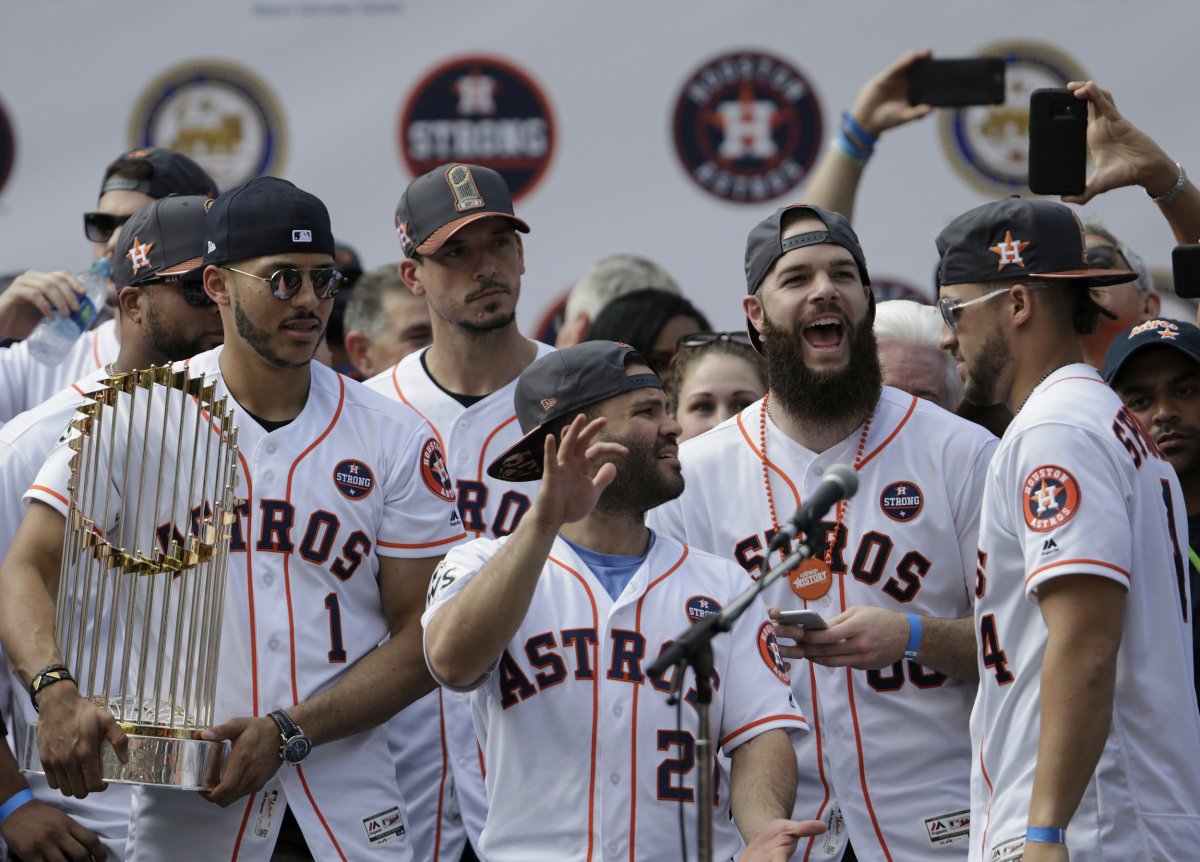Take the cheating out of baseball? Are you nuts?
Major League Baseball Commissioner Rob Manfred imposed sanctions on two members of the Houston Astros for using their video replay system to steal signs, which violated the "principles of sportsmanship and fair competition." Leave aside for the moment that's hogwash. Where was this concern for fair competition when hitters juiced on performance enhancing drugs were knocking balls out of baseball parks like it was backyard Nerf?
It's not that stealing signs is even illegal. It's just how the Astros and, allegedly, the Red Sox did it. Manfred's report said, "At the outset, it is important to understand that the attempt to decode signs being used by an opposing catcher is not a violation of any Major League Baseball Rule or Regulation. Major League Baseball Regulations do, however, prohibit the use of electronic equipment during games...." So it's not the actual principle that's at issue, just the practice of using all them newfangled computers and electronics and stuff.
The sanctions are also dumb because baseball needs more cheating, not less. Baseball is boring. I'm sorry, George Will, but it is. It is a game designed for a different era, one with more time and fewer entertainment options. Other sports have sped up to make themselves more attractive, like basketball adding a shot clock or cricket reducing matches from 4 days to 4 hours. Baseball has gone in the other direction. When MLB started keeping track in 1924, the average game was an hour and fifty-four minutes. They've been getting longer ever since. In 2019, the average game lasted three hours and ten minutes. And that's despite a raft of new rules supposedly intended to speed it up. Perhaps that's why attendance at baseball games peaked over a decade ago at 80 million or so and is now down below 70 million.

But getting rid of cheating is also against the spirit of the game. Cheating and chicanery have always been part of baseball. Part of the charm is knowing that grown men who on average make around $10,000 an hour still try the same silly tricks as Little Leaguers—pretending to catch balls they trapped, or pulling a pitch back into the strike zone, or a third baseman asking a rookie to step off a base so he can straighten it and then tag the runner with a hidden ball (Matt Williams, twice) or a batter limping to first base after pretending to have been hit. Sports is all about vicarious entertainment, us watching athletes do things we can't do. Perhaps part of it's also about watching them do things we won't do, like cheating.
Cheating is part of baseball lore, like Ty Cobb supposedly sharpening his spikes so defenders would jump out of his way when he slid (urban legend disproved by Cobb biographer Charles Leehsen). Pitchers have loaded their gloves with spit and Vaseline (Gaylord Perry, Lew Burdette and Orel Hershiser), sandpaper (Joe Niekro and Don Sutton) metal objects (Whitey Ford and Rick Honeycutt) and pine tar (Michael Pineda and Kenny Rogers). Batters have swung corked bats (Wilton Guerrero, Billy Hatcher, Albert Belle and Graig Nettles). Playing drunk or on amphetamines? Oh please—have you ever read Ball Four?
Many of baseball's most enduring moments have been the result of cheating. Bobby Thompson's iconic homerun in 1951 was off a tipped pitch. The great home run race of 1998 between Sammy Sosa and Mark McGwire was the result of steroids. Apparently the Astros World Series that meant so much to Houston after Hurricane Harvey was connected to the sign stealing.
Many of the game's most celebrated players were cheaters. Seven-time Cy Young Award-winner Roger Clemens was named 82 times in the Mitchell Report on steroids, as was Barry Bonds, baseball's all-time leader in home runs. Pete Rose, baseball's all-time hits leader, has been accused of using a corked bat. In baseball, cheaters who get away with it are celebrated, not ostracized. Perry bragged about his cheating, titling his autobiography "Me and the Spitter." He was elected to the Baseball Hall of Fame after it was published. Alex Rodriguez, admitted steroid cheat and J.Lo's significant other, is now an announcer on national TV broadcasts.
Cheating makes baseball more interesting. Doctored baseballs lead to more strikeouts. Stealing signs and corked bats to more hits. Steroids to more homeruns. To paraphrase Gordon Gekko, cheating is good. Yes, we could have baseball without cheating and cheaters, but does anyone really want to watch games without Rose, Bonds, Clemens and Rodriguez?
So why the harsh punishments from Manfred—year-long suspensions of Houston manager A.J. Hinch and Jeff Luhnow, with likely more to come for Alex Cora and Carlos Beltran? Perhaps it's a cyclical thing. Maybe once every century or so baseball feels obligated to take a stand around the "integrity of the game." The Black Sox scandal that got eight players banned for match-fixing occurred in 1919. Perhaps Manfred is sending a signal to sports bettors, as did Judge Kennesaw Mountain Landis.
Whatever Manfred's rationale, it's dumb. If I have to sit through three hours of watching pitcher after pitcher come out of the bullpen and throw eight warm-up pitches and then face just a single batter, of watching batters step out of the box after each pitch and carefully readjust their gloves and helmets, of watching replay after replay, then at least give me a little cheating so I have something to laugh about with the guy sitting next to me.
Uncommon Knowledge
Newsweek is committed to challenging conventional wisdom and finding connections in the search for common ground.
Newsweek is committed to challenging conventional wisdom and finding connections in the search for common ground.
About the writer
To read how Newsweek uses AI as a newsroom tool, Click here.








